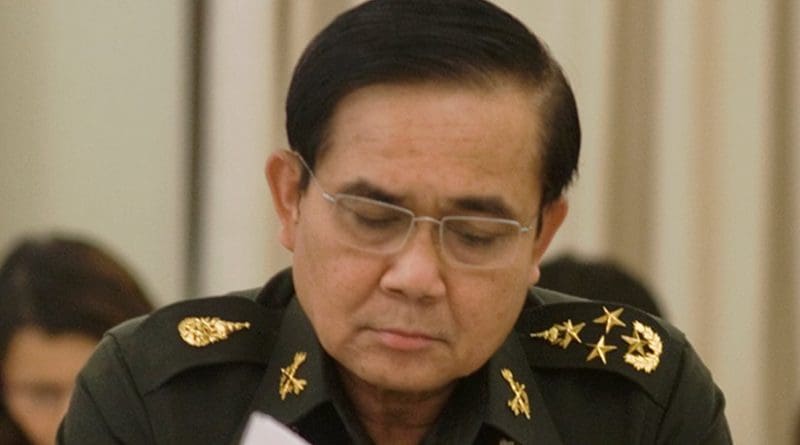Two Years Since Thai Coup No Democracy In Sight – OpEd
By Grace Guo
It has been two years since Thailand’s junta toppled the democratically elected government of Yingluck Shinawatra on May 22, 2014. Headed by general-turned-prime minister Prayuth Chan-ocha, the military government swiftly implemented draconian measures to control society, rein in voices critical of the government and monarchy, and fight religious insurgents. However, the increasingly despotic policies have nurtured discontent with the junta. Defying restrictions on the freedom of assembly, hundreds of anti-coup protestors demonstrated in Bangkok to mark the two-year anniversary of the coup. While calls for an end to military rule are mounting, whether and when democracy will be restored remains uncertain.
Chances for democracy to return look slim indeed. Under the aegis of Prayuth Chan-ocha, the junta – also referred to as the National Council for Peace and Order (NCPO) – has thus far failed to deliver on the prime minister’s pledge to gradually return to democracy in three steps, namely “national reconciliation, comprehensive reforms and reinvigoration of democratic institutions.” A meaningful process for restoring civilian rule has yet to materialize as the junta has instead constantly published ever-new timelines. The issue is exacerbated by ongoing quarrels over Thailand’s draft constitution. On March 29 this year, the government published a new constitutional draft that will be put to a referendum on August 7. The draft proposes significant institutional reform by establishing a senate appointed by the military. That way, the senate may eclipse the independent law and policy-making authority of an elected parliament.
According to Thailand-based academic Paul Chambers, this institutional change “expands military and judicial power at the expense of democracy,” setting the stage for military rule of at least eight years. Hence, Thailand is well on its way to establish the tools for a deep state where the junta assumes royal legitimacy to expand its powers and circumvent the regular state. The result is an increased militarization of state institutions, such as the police. The junta has already bequeathed the military with traditional law-enforcement mandates, including the authority to arrest and detain suspects, search properties without a warrant, as well as act as interrogators.
Human Rights Abuses
The military is ruling with an iron fist, exemplified by the increasingly flagrant human rights abuses perpetrated. Thailand’s exceptionally strict lèse-majesté laws have come to be applied arbitrarily for even the lightest of perceived infractions. The junta has even asked foreign countries to extradite Thai nationals living abroad accused of insulting the monarchy. Since the coup in 2014, some 60 people have been charged. Most worrisome is the fact that defendants are tried in military courts, often secretly, thereby curtailing the rights to adequate defense. In late April, the military arrested two Facebook users and an activist for royal defamation and charged them with sedition and crimes under the Computer Crime Act in a military court, facing up to 15 years in prison.
Yet, not even foreign dignitaries are being spared. US ambassador to Thailand, Glyn Davies, is currently being investigated for royal defamation after expressing concern about the harsh sentencing in lèse-majesté cases. In an Japan Times op-ed, Sek Wannamethee, a high-ranking official in the Thai Ministry of Foreign Affairs, dismissed the charges against the government that the royal defamation law has been politicized as “an overstatement of the current situation.” However, given the law’s broad application and flimsy charges leveled against suspects, this statement belies the fact that the law is merely a tool to silence any opposition to the junta.
Beyond the political struggles in Bangkok, broader crises have deteriorated further. First, as a result of the junta’s uncompromising approach to the insurgency in Southern Thailand, the divide between Buddhist and Muslim populations has widened and exacerbated the conflict. Despite the military’s own stated goal of appeasing the region by 2015, the realities on the ground are quite different, as extremist violence marked by beheadings and bombings shows no signs of abating.
Second, Thailand’s economy continues to stagnate. In its Global Economic Prospects report, the World Bank marked Thailand as the third weakest ASEAN economy in 2016, because the junta has failed to reduce the record household debt hovering around 81.5 percent of GDP that cripples all attempts to reinvigorate the economy by boosting consumption. Furthermore, the military’s policies created new chasms between the Bangkok elites and the rural populations of Thailand’s north – traditional supporters of the ousted Shinawatra family.
The longer it takes Thailand to return to democratic rule, the more isolated and entrenched the junta will become. Already, Prayuth’s government in Bangkok has turned to Beijing and Moscow to substitute for diminished support from Washington and Europe. Despite the major issues concerning democratic governance in the Thai constitution being all but self-evident, Thailand’s junta is determined to press ahead all the same

